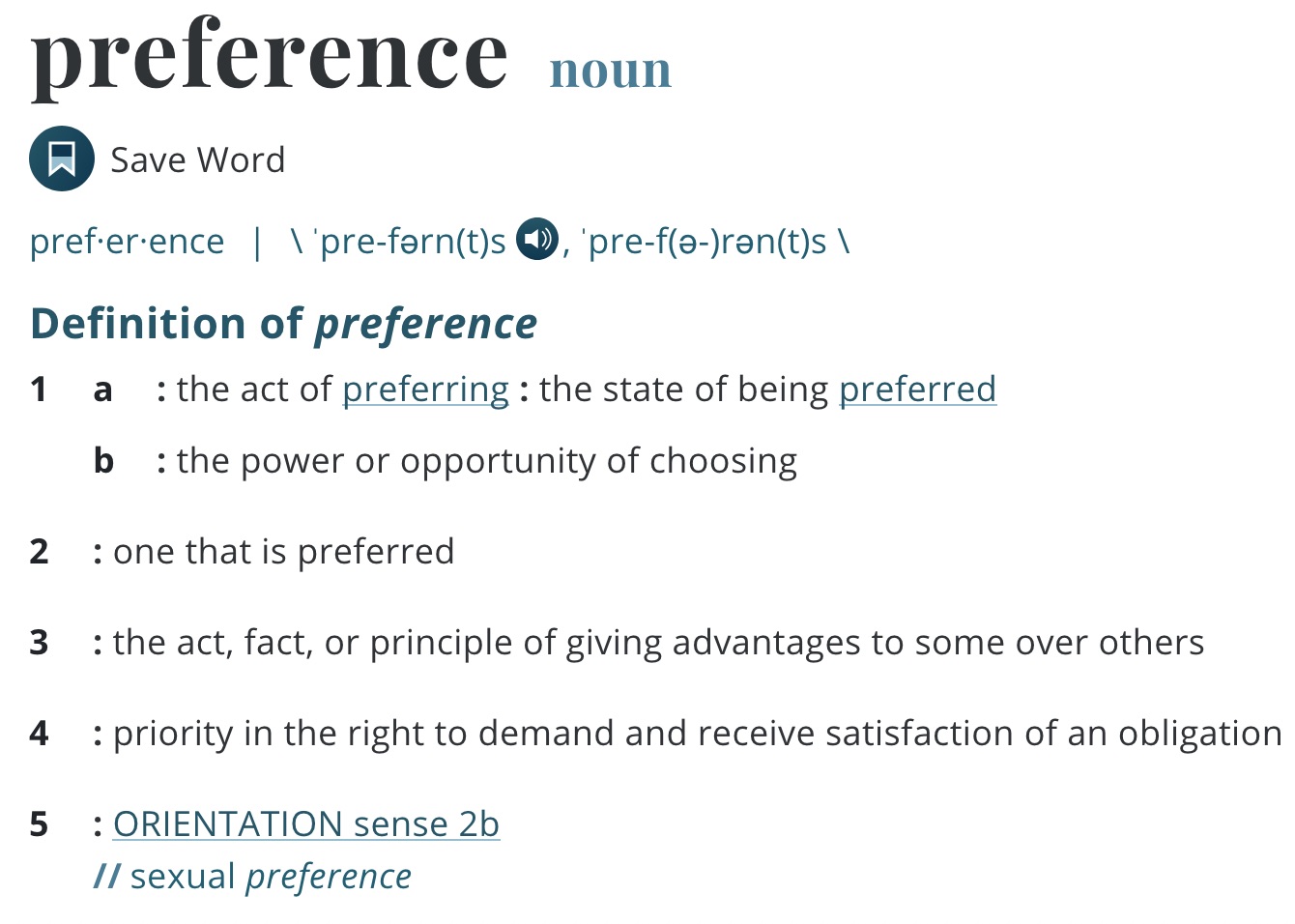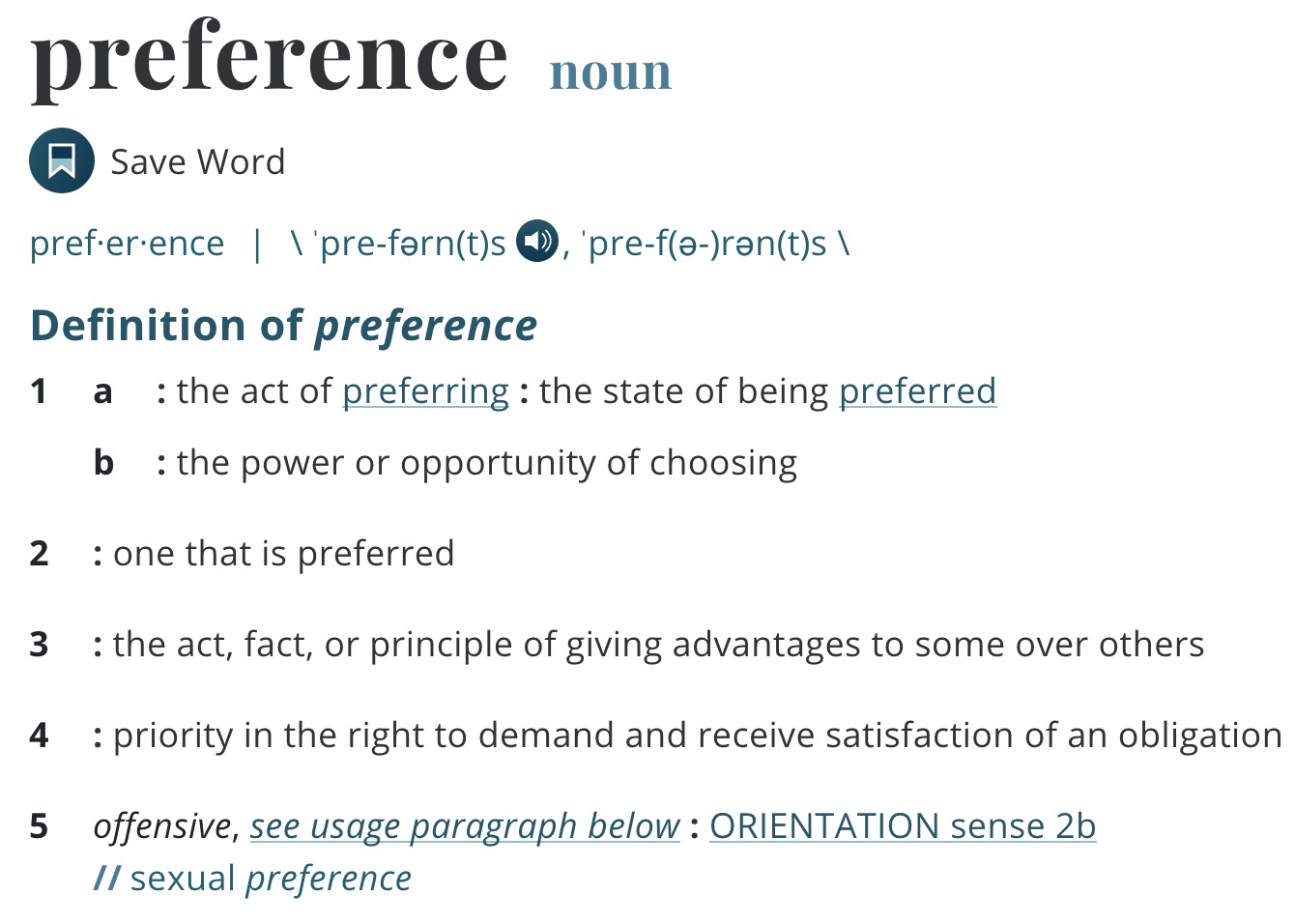Note: this post has an addendum as of Friday evening, 10/16/20.
Words have meaning.
“Antelope waddle towards the shiny Giant Can Opener” is a sentence likely never before constructed, but it’s intelligible to you (albeit oddly fantastic) because we share a language—21st century American English. The fact that words have meaning isn’t an interesting footnote, it is absolutely integral to the purpose of language.
Yesterday, Merriam-Webster updated an entry in their dictionary. Generally speaking, bravo, good for them; the meaning of words do change over time, so an accurate dictionary must be nwell maintenanced. But in this case, I am profoundly troubled, and you should be too.
Language must have some dynamism, an ability to change, but the power of language is a robust stability which allows a large group of disparate people to read an essay such as this and understand the concepts put forth. When we redefine words on a whim, we introduce confusion at best and perpetrate malicious fraud at worst.
Back to yesterday. During a confirmation hearing for Supreme Court nominee Amy Coney Barrett, some fuss was made regarding a phrase she used. She said, “I have never discriminated on basis of sexual preference.” Later on, Senator Hirono noted, “Not once, but twice, you used the term sexual preference to describe those in the LGBTQ community. And let me make clear, sexual preference is an offensive and outdated term.”
It is a true that nearly three decades ago, an APA article did recommend orientation over preference, “The term sexual orientation is preferred to sexual preference for psychological writing and refers to sexual and affectional relationships of lesbian, gay, bisexual, and heterosexual people.” However, one journal article making a recommendation hardly changes the meaning of the phrase for 21st century American English speakers.
But the question is not what did the APA recommend thirty years ago? The question is what does the phrase “sexual preference” mean? Senator Hirono firmly stated that the phrase is outdated and offensive. And many others agreed.
Apparently, as of yesterday, a whole slew of persons confidently understood this to be an obviously offensive phrase. But is it really? Again, I don’t mean to say what should be said, or what is the best phrase in this instance, but simply does this phrase, sexual preference, really necessarily convey something offensive and “outdated”?
A quick Internet search shows that within the past five years CNN has published multiple articles using the phrase “sexual preference” as a synonym for sexual orientation.
Even more on the nose, earlier this year, Vice President Biden said, “rebuild the backbone of this country, the middle class, but this time bring everybody along regardless of color, sexual preference, their backgrounds.” (Begin video around 4:00.)
Feel free to agree with the APA article from ’91 and prefer sexual orientation over sexual preference, but don’t pretend this phrase means something offensive in American English. It doesn’t. And no one pretended it did prior to yesterday.
This whole discussion reveals profound intellectual dishonesty that disrupts meaningful dialogue. But what disturbs me and makes me wonder about our future is this: during the overly-long hearing and the bustle of tweets, someone was quietly editing a dictionary entry. Thanks to the power of the Internet Archive which periodically saves most of the Internet—yeah, once something is online, it’ll likely exist for as long as computer continue to exist—we can see Merriam-Webster’s definition #5 for preference from September 28, and then again as of this morning at 3am. The links should work fine, but for your convenience, screenshots below:


This might seem trivial, but this kind of gaslighting undermines our ability to use words, the building blocks for communication. Politicians say all manner of unhelpful and even terrible things, I make no defense for them here. But dictionaries!? Dictionaries purposefully confusing language to score political points is shocking and loathsome.
I love English. I love dictionaries. This is sad.
UPDATE BELOW: 10/16/20 17:25 EDT ————————
The Two Days Later Update
This post has generated some engaging and helpful discussion. I wanted to take a moment to update some information and address some common concerns or objections:
First, I’d noted the APA ran an article preferring sexual orientation over sexual preference back in 1991, and it certainly wasn’t entirely stand-alone: an editor at the Chicago Tribune argued in favor of orientation over preference back in 1986, a piece in Slate made a similar case in 2013, and I’m sure there are many other examples. I wasn’t aware of all these, so I appreciated some of you readers sharing them with me.
Second, it’s important to maintain that although some may argue that preference in this context is not synonymous with orientation and implies choice, that is not clear linguistically nor has it been the prevailing notion which has treated them synonymously (see Merriam-Webster’s definition prior to Tuesday, screenshot above). As a diabetic friend of mine observed, his drink preference is Dr. Pepper and that preference isn’t a choice, it’s just what he likes the most. But maybe he generally chooses not to drink it since sugar isn’t particularly convenient. And thus we see how a preference may not be a choice at all but certainly there still are plenty of choices in life. We cannot easily choose to change our preferences because preference is not a synonym for choice.
Third, for the record, I don’t believe I have ever used the phrase sexual preference. It does feel a bit old. Given it is still commonly used, it isn’t archaic in the dictionary sense, but clearly the trend is moving towards saying orientation; whether you’re a fan of that trend or not, it is what it is.
Fourth, while I was unaware of this fact prior to this week, there are some who clearly dislike the phrase and seem to be offended by it. I don’t think Joe Biden, Amy Coney Barrett, or most any others who’ve used the term in the past year intended any offense, but that doesn’t mean some weren’t offended.
Fifth, the fact that someone is offended by a term doesn’t change the definition of that term. The common meaning of a word doesn’t come from one person but from the understanding by most in the society. For example, maybe the phrase mustard yellow is offensive to you because of some strange happening in your childhood. If I’ve offend someone with this phrase, I would be sorry, and once I knew, I would try to avoid using the phrase with them! However, that itself doesn’t make the phrase mustard yellow offensive in the English language. English is spoken by hundreds of millions of people. Meanings do change, and words can become offensive (e.g., it happened with the word retard). Dictionaries are not to reflect the opinions of a few regarding a phrase but the common understanding of a phrase.
Sixth, when prominent persons say words that are commonly understood as offensive, that is significant. Even if they are intending to say something generally positive, when they use offensive words, that is a big deal. If Kamala Harris made a statement regarding building a diverse coalition (a good thing), but then began to unleash a string of epithets describing various groups within such a coalition…that would be troubling to say the least! Similarly, if this phrase (sexual preference) were commonly understood to be offensive, regardless of whether or not you are personally offended, we would all take note when someone prominent said it.
Seventh, prominent persons have said the phrase sexual preference in the not distant past (e.g., Joe Biden just earlier this year). Where was the fuss? Why?
And not just Biden, others have used this phrase too. Watch this short clip for just a few more examples:
Were we all thinking, “Oof, that’s rough! What an outdated and offensive term!”? No. At least, not prior to Tuesday. Is this because we all let Democrats say racist, sexist, or homophobic things? No, we were not giving them a free pass. We weren’t shocked because the phrase isn’t commonly understood as offensive.
Now, it seems that a few persons (and by few, this could be millions given I’m comparing to hundreds of millions of English speakers) were offended. And on behalf of Barrett and Biden and RBG, I’m sorry you were offended, I’m sure that wasn’t their intention. No one with a platform, however, raised this issue in any of these instances until with Barrett Tuesday because the phrase sexual preference is not commonly understood to be offensive.
Eighth, when Barrett used the phrase, it would’ve be the perfect opportunity for the few who do find it offensive to note that and let us know their take and why they dislike the term, however, this isn’t what happened. What we observed wasn’t an informing the broader English speaking community but a presumptuous redefining of a phrase and then concurrent outrage towards someone who’d used it under the dictionary definition as of that morning only to find that very dictionary (edited during the scolding of a respected judge) now defined the phrase as offensive.
Ninth, which brings me to my primary concern: language changes, and dictionaries should reflect this, but dictionaries shouldn’t take part in actively changing language to pull the rug out from under participants engaged in language discussion. This is profoundly unfair, intellectually dishonest, and deeply troubling.